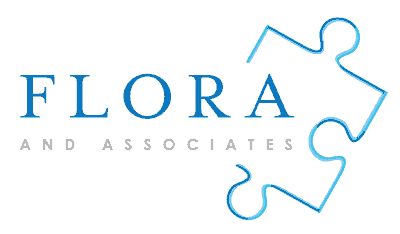Exposure and Response Prevention for OCD: How It Works and Why It’s Effective
Introduction
Obsessive-Compulsive Disorder (OCD) can feel overwhelming, both for those experiencing it and for the families who want to help. Repetitive thoughts, compulsive behaviors, and the anxiety they bring often disrupt daily routines and family life. The good news is that highly effective treatments exist. One of the most trusted approaches is Exposure and Response Prevention (ERP), a type of cognitive behavioral therapy proven to reduce symptoms and improve quality of life.
At Flora & Associates, we help children, teens, and adults across Northern New Jersey navigate OCD and related challenges like eating disorders with supportive, individualized therapy. This blog explains how ERP works, why it is considered the gold standard for OCD treatment, how it also benefits those struggling with eating-related anxieties, and what families can expect when beginning this therapeutic journey.
What Is Exposure and Response Prevention (ERP)?
Exposure and Response Prevention is a structured form of therapy designed specifically for OCD and anxiety-based disorders, including eating disorders. It works by gradually helping individuals face the thoughts or situations that trigger their anxiety (the “exposure”) while learning to resist the urge to perform compulsive behaviors (the “response prevention”).
Exposure: This might involve gently confronting a feared situation in a safe and supportive way, such as touching an object believed to be “contaminated,” or eating a food that feels anxiety-provoking for someone recovering from restrictive eating patterns.
Response Prevention: Instead of engaging in the usual compulsion, such as washing hands repeatedly or avoiding meals, the person practices resisting that behavior with guidance from a therapist.
Over time, repeated practice reduces the intensity of anxiety and breaks the cycle of obsessions and compulsions or, in the case of eating disorders, the fear-food and avoidance cycles that maintain disordered eating behaviors.
Why ERP Is So Effective for OCD and Eating Disorders
ERP has been researched for decades and is consistently shown to be the most effective behavioral treatment for OCD. Its principles are also highly effective for eating disorders such as anorexia, bulimia, and ARFID, where anxiety and avoidance patterns often mirror those seen in OCD. Families often see improvement because ERP does more than temporarily reduce symptoms; it changes how the brain responds to triggers.
Benefits of ERP include:
- Lower levels of anxiety and distress during triggering situations
- Reduced frequency and intensity of compulsive or avoidance behaviors
- Greater confidence in managing intrusive thoughts and urges
- Long-term improvement that continues even after therapy ends
By facing fears step by step, whether it is contamination fears, calorie anxiety, or rigid meal-time rules, individuals learn that their anxiety naturally decreases over time without needing to perform compulsions. This empowers both children and adults to regain control of their lives.
What Families Can Expect in ERP Therapy
ERP can sound intimidating at first, but therapy sessions are always paced carefully and tailored to each person’s needs. At Flora & Associates, we work closely with children, teens, and families so no one feels pressured or unsupported.
In a typical ERP process, families can expect:
- Assessment: Understanding the child’s or adult’s unique OCD or eating disorder patterns
- Collaborative Planning: Setting goals together with the individual and family
- Gradual Exposures: Starting with mild triggers and building up to more challenging situations, such as eating certain foods or resisting body-checking rituals
- Supportive Coaching: Teaching strategies to manage anxiety, build body trust, and strengthen resilience
- Parent Involvement: Helping caregivers learn how to support progress without reinforcing compulsions or avoidance behaviors
This step-by-step approach makes ERP not only effective but also manageable, even for young children and teens navigating both OCD and eating challenges.
Supporting Children and Teens with OCD and Eating Disorders
For parents, it can be difficult to watch a child struggle with OCD symptoms or eating-related fears. ERP provides a clear, compassionate framework to support healing. Children and teens learn that they are stronger than their anxious thoughts, while parents gain tools to encourage healthy coping at home.
When applied to eating disorders, ERP helps young people rebuild a healthy relationship with food by gently facing food-related fears and learning to tolerate distress without avoidance. Early intervention is especially important. When OCD or eating disorder symptoms are addressed promptly, children and teens can focus on school, friendships, and daily life without being weighed down by compulsions or restrictive behaviors.
The Science Behind Exposure and Response Prevention
ERP is rooted in decades of psychological research on how the brain responds to fear and anxiety. OCD and eating disorders both create cycles where intrusive thoughts (obsessions) lead to repetitive or avoidant actions (compulsions or restriction) designed to reduce anxiety. Unfortunately, these behaviors only provide temporary relief and reinforce the cycle over time.
Exposure and Response Prevention helps break this pattern by teaching the brain that it does not need compulsions or avoidance to manage fear. Through gradual exposure, individuals experience that their anxiety naturally decreases without completing the compulsive action. This process, called habituation, allows the brain to form new pathways and reduce the intensity of obsessive thoughts, body-related fears, or food-related anxiety.
Research consistently shows that ERP creates lasting change, often with results that continue long after therapy ends, both for OCD and for eating disorders where anxiety plays a central role.
Overcoming Common Fears About ERP
Many families feel hesitant when they first hear about Exposure and Response Prevention. It can sound intimidating to face fears directly, especially when a child or teen is already struggling with anxiety, obsessive thoughts, or food fears. These concerns are completely normal.
In reality, ERP is designed to be safe, gradual, and supportive. Therapists never force exposures but instead guide individuals through steps that feel manageable. The process starts small, such as touching an object briefly or taking one bite of a feared food, and builds confidence before moving to more difficult triggers. Parents are often surprised by how resilient children can be when they feel supported and encouraged. ERP sessions also emphasize coping strategies, mindfulness, and body-awareness skills, so individuals learn how to calm themselves and reduce stress while practicing new behaviors. This balance of challenge and support helps families see progress without feeling overwhelmed.
How Parents and Caregivers Can Support ERP at Home
Family involvement is one of the most important parts of successful ERP therapy. Children and teens benefit when parents and caregivers understand the process and reinforce healthy habits at home.
Practical ways families can help include:
- Encouraging practice: Supporting children in completing exposure exercises between sessions, whether it is tolerating uncertainty or eating a challenging food
- Avoiding reassurance cycles: Instead of repeatedly answering anxious questions, gently remind your child to use coping tools learned in therapy
- Modeling calm responses: Children learn from the adults around them, so showing steady and calm reactions helps them build confidence
- Celebrating small wins: Progress in ERP comes step by step. Acknowledging each success builds motivation and resilience
By partnering with the therapist and staying engaged, parents and caregivers play a powerful role in helping their child break free from OCD or eating disorder cycles.
Conclusion
Living with OCD or an eating disorder can feel isolating, but you and your family do not have to face it alone. Exposure and Response Prevention therapy is a proven, supportive approach that empowers children, teens, and adults to overcome fears, reduce compulsions, and build a healthier relationship with food, body, and mind.
At Flora & Associates, we walk alongside families in Sparta, Jefferson, Byram, Rockaway, and beyond to provide guidance, reassurance, and lasting strategies for change. If you are ready to explore how ERP can help your child or family, we invite you to contact us today. Together, we can build a path toward calm, confidence, and hope.

